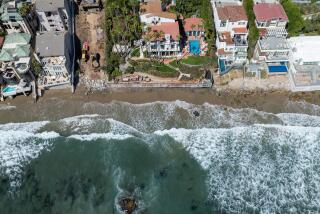San Diego bike-share program hits snags over modest use, rental locations
- Share via
Reporting from SAN DIEGO — This city’s first experiment with the worldwide trend of bike-sharing has been a bumpy ride so far.
Use of San Diego’s large network of rental stations has been modest since it began operating in January, and community leaders complain the company running the network is cherry-picking lucrative locations instead of focusing on sites that would get commuters out of their cars.
Critics say the company, DecoBike, feels pressure to generate revenue because, unlike virtually all of the other 800 cities across the globe with bike-sharing networks, San Diego chose not to subsidize its program because the city’s mild weather creates year-round revenue opportunities.
DecoBike officials say momentum behind the network continues to build and that usage will meet expectations once the company “fine tunes” its system and the number of stations increases from the current 85 to a planned 180.
They say choosing station locations is a complex process involving multiple factors, including requests from users, that they must weigh against each other.
Supporters of bike-sharing, in which people pay a fee to rent bicycles at one station and can drop them off anywhere along the network, say the community should be patient because the network is a key component of city efforts to reduce traffic congestion and pollution by getting more people out of their cars.
Community leaders say they understand and support those goals, but still object to many of the station locations and how DecoBike is choosing them.
“The city and DecoBike haven’t really been that public with where they intend to place the bike stations, what the process is and what the timeline is,” said Gretchen Newsom, president of the Ocean Beach Town Council.
Vicki Granowitz, chair of the North Park Planning Committee, said her group spent hours analyzing proposed station locations with DecoBike, but their advice was ignored in the end.
“They didn’t put them in any of the places we recommended,” Granowitz said. “Bike-sharing is a good idea, but the implementation has been terrible.”
Such frustration recently boiled over in Pacific Beach, where DecoBike installed two stations along the boardwalk despite community objections that the area is too crowded and that the racks are an eyesore.
“They blindsided everyone,” said Bill Allen, owner of the Crystal Pier Hotel, near one of the stations. “It’s ridiculous.”
Brian Curry, chair of the Pacific Beach Planning Group, said it appears DecoBike is trying to maximize its revenue by targeting tourists at the beach instead of creating a network geared to commuters, which was supposed to be the program’s goal.
“We urged them to put the stations where they’d make sense for someone needing a bike to go to a transit stop or the grocery store,” Curry said. “But they continued to push for locations in our hospitality visitor district. When we objected, they just quit talking to us and then did it.”
DecoBike officials said they met extensively with community groups in Pacific Beach before installing the stations.
“After hearing feedback from the community at large, evaluating the transportation network and additional careful evaluation, kiosks were strategically installed that would increase connectivity to San Diego’s network of transportation options,” company officials Marianna Corkill and Melinda Pederson said in a joint emailed statement.
Curry said another concern about DecoBike is new competition for the many bike rental businesses in Pacific Beach.
The community raised concerns about bike-sharing’s effect on local businesses right from the start, he said. Because DecoBike is partners with the city and gets free land for stations, he called the situation unfair.
“The city is basically competing with our local bike shop owners,” he said.
Mayor Kevin Faulconer’s office referred all questions to DecoBike officials.
The company, which operates similar networks in Miami and some smaller cities, said it isn’t in direct competition with bike shops because their business model includes pickup and drop-off at the same site, in contrast with the bike-sharing network’s opportunity to pick up at one site and drop off at another.
In the DecoBike email, Corkill and Pederson said the new beach stations are based on requests from users. They declined to provide revenue data, but said nearly 700 members have bought $125 annual memberships and the network has logged more than 75,000 rides. The company offers flat-rate rentals for $5 a half-hour, $7 for an hour and $12 for two hours.
“Revenue has been on a par with our expectations and industry standards for introducing a new transportation system into the city,” Corkill and Pederson said in the email. “Once we’ve completed a full year of operations, we will be able to provide a clearer picture of our success.”
They noted that city taxpayers contribute nothing to the program, while DecoBike has invested more than $8 million installing racks and bicycles.
People should be patient with DecoBike, said Andy Hanshaw, executive director of the San Diego County Bicycle Coalition.
“It’s taken some time to get set up and established, but I continue to see more and more people using it,” he said. “It’s definitely making an impact.”
More to Read
Sign up for Essential California
The most important California stories and recommendations in your inbox every morning.
You may occasionally receive promotional content from the Los Angeles Times.










